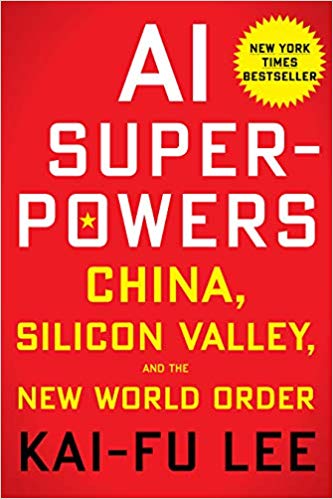You have /5 articles left.
Sign up for a free account or log in.
 AI Superpowers: China, Silicon Valley, and the New World Order by Kai-Fu Lee
AI Superpowers: China, Silicon Valley, and the New World Order by Kai-Fu Lee
Published in September of 2018
AI Superpowers is one of those good books with bad titles. This is a book that is tempting to pass over because its cover makes it sound sensationalistic and shallow. The contents of the book are neither.
Any publisher tempted to put the words Super-Powers and New World Order in any book title should think twice.
A better title might have been something like Deep Learning and the Dawn of the Narrow AI Economy. Or maybe How China and the US are Creating the Future AI Economy.
If you can get past the title, what you will find is a fascinating story of how both Chinese and US companies are leveraging narrow AI to build the next generation of world-changing companies.
Kai-Fu Lee is well-positioned to tell this story from the Chinese and US angles. Lee is an AI scientist (PhD Carnegie Mellon) who has had leadership roles at Apple, Microsoft, and Google. Before moving into a role as a venture capitalist and author, Lee founded Microsoft Research Asia and was then president of Google China.
The description that Lee provides of the fundamentals and potential impact of artificial intelligence is among the best that I’ve encountered. His focus is on narrow AI, and the incredible advances in this technology made possible by deep learning.
Narrow AI is optimized to execute on tasks that are definable and constrained in scope. These tasks might involve using an array of sensors and cameras to enable an automobile to drive while obeying traffic rules and avoiding hitting other vehicles, pedestrians, or stationary objects. Or narrow AI could power decision support systems that help physicians derive a diagnosis and come up with a treatment plan.
Deep learning explains why the robustness and accuracy of the algorithms that underpin recent advances in systems powered by narrow AI have undergone exponential improvements. Deep learning is a description of the process in which enormous quantitates of data are used to train an AI system. The system optimizes for the desired outcomes based on its ability to draw connections and correlations from the data.
The fact that we are in the middle of a narrow AI revolution may not seem all that momentous. Why should we care so much about the combination of fast processing, powerful sensors, abundant data, and robust algorithms?
A good answer to this question can be found in AI Superpowers. Lee describes how narrow AI underpins a whole new section of the economy called O2O, or online to offline. We use O2O services each time we use our phones to order an Uber or a Lyft. The AI systems that power these transportation platforms are optimizing for driver availability and pricing.
In China, O2O platforms are extending to everything from personal services (barbers and manicurists dispatched through an app) to food service to bicycle rental. China is leaps and bounds ahead of the US in moving toward a system of digital payments mediated by phones.
Almost any service that depends on matching supply with demand will become dramatically more efficient when paired with AI. As AI platforms begin to take over some of the tasks that people once did, such as driving all those Uber and Lyft cars and the trucks that deliver most goods, costs will come down further.
The worry, of course, is what will happen to all those humans who are now out of work. Replaced by machines that are controlled through an ever more efficient set of narrow AI technologies.
This jobless future is less of concern in China as in the US, as technological progress has been what has enabled China to move from a very poor to a medium-income country in the short time frame of a few decades. The Chinese government, unlike the US government, is making big investments in the development of narrow AI. Lee’s book is something of a warning of the long-term risk for the US of not making this investment.
While I learned a great deal from AI Superpowers, the book does have its blindspots. While I enjoyed reading about the rough and tumble Chinese startup culture (no nap pods or free meals), I was surprised that Lee seems untroubled by China’s political system. Lee points out that China can mobilize large-scale investments in new technologies. What he fails to mention is the brittleness of a society that lacks basic individual freedoms of expression and dissent.
Lee lives and works in China, and I’m certain that his unwillingness to critique the Chinese government has everything to do with how much control the government exerts in every sector of the economy. This uncritical stance towards the Chinese government ultimately weakens Lee’s case that China is better poised than the US to navigate the coming AI revolution.
What are you reading?








